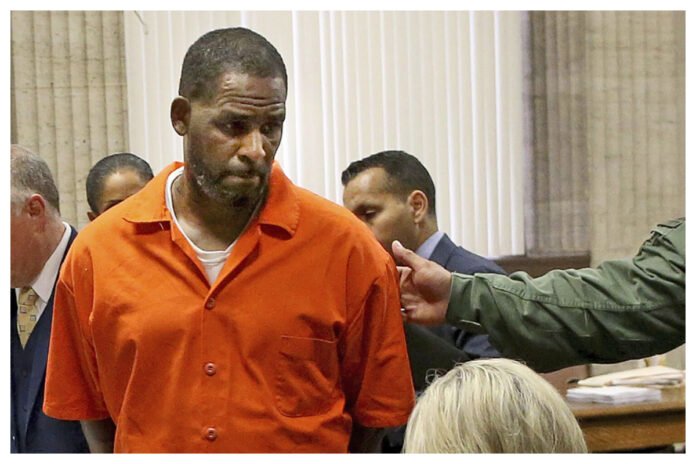A Chicago prosecutor said Monday that she’s dropping sex-abuse charges against singer R. Kelly following federal convictions in two courts that should guarantee the disgraced R&B star will be locked up for decades.
Cook County State’s Attorney Kim Foxx announced the decision a day ahead of a hearing related to state charges accusing him of sexually abusing four people, three of whom were minors. She said she would ask a judge to dismiss the indictments Tuesday.
Foxx, who in 2019 had pleaded with women and girls to come forward so she could pursue charges against Kelly, acknowledged that the decision “may be disappointing” to his accusers.
“Mr. Kelly is potentially looking at the possibility of never walking out of prison again for the crimes that he’s committed,” the prosecutor said, referring to his federal convictions. “While today’s cases are no longer being pursued, we believe justice has been served.”
Since Kelly was indicted in Cook County in 2019, federal juries in Chicago and New York have convicted him of a raft of crimes, including child pornography, enticement, racketeering and sex trafficking related to allegations that he victimized women and girls.
Kelly, born Robert Sylvester Kelly, is serving a 30-year prison sentence in the New York case and awaits sentencing on Feb. 23 in Chicago federal court.
He is appealing those convictions. Based on the New York sentence alone, the 56-year-old won’t be eligible for release until he is around 80.
Foxx said she reached out to Kelly’s lawyer two weeks ago to indicate that charges might be dropped. She also spoke to the women whose allegations were at the heart of the case.
Foxx expressed praise for the “courage it took for them to come forward.”
Kelly’s attorney, Jennifer Bonjean, said she was “pleased” with the prosecution’s decision to drop charges.
“He only has one life to give. So I don’t know how many sentences upon sentences would satisfy people,” Bonjean said.
Lanita Carter, who said she was sexually assaulted by R. Kelly in February 2003, said she was “extremely disappointed” with the news.
“I have spent nearly 20 years hoping that my abuser would be brought to justice for what he did to me. With today’s announcement, all hope of justice for my case is gone,” Carter said, adding that she trusted Foxx and her office with her story and has spent four years steeling herself to face Kelly to no avail.
“Justice has been denied for me,” she said.
Prosecutors sometimes choose to go ahead with more trials out of a concern that convictions elsewhere could be reversed during appeals. They see an opportunity for additional convictions as insurance.
“We didn’t do a monetary cost-benefit analysis,” Foxx said, adding, however, that resources spent on a trial now could instead be used “in advocacy for other survivors of sexual abuse.”
Another sexual-misconduct case is pending in Hennepin County, Minnesota, where the Grammy Award-winner faces solicitation charges. That case, too, has been on hold while the federal cases played out. Minnesota prosecutors haven’t said whether they still intend to take Kelly to trial.
Known for his smash hit “I Believe I Can Fly” and for sex-infused songs such as “Bump n’ Grind,” Kelly sold millions of albums even after allegations about his abuse of young girls began circulating publicly in the 1990s. He beat child pornography charges in Chicago in 2008, when a jury acquitted him.
Widespread outrage over Kelly’s sexual misconduct didn’t emerge until the #MeToo reckoning and the release of the Lifetime docuseries “Surviving R. Kelly” in early 2019.
Foxx announced the Cook County charges months before the federal cases in New York and Chicago. Foxx’s office alleged he repeatedly sought out girls for sex, including one he encountered at her 16th birthday party and another who met Kelly while he was on trial in 2008.
Federal prosecutors in New York told jurors at his 2021 trial that Kelly used his entourage of managers and aides to meet girls and keep them obedient, an operation that prosecutors said amounted to a criminal enterprise.
Last year, prosecutors at Kelly’s federal trial in Chicago portrayed him as a master manipulator who used his fame and wealth to reel in star-struck fans, some of them minors, to sexually abuse then discard them. Four accusers testified.
While prosecutors in that case won convictions on six of the 13 counts against him in that case, the government lost the marquee count — that Kelly and his then-business manager successfully rigged his 2008 child pornography trial.


